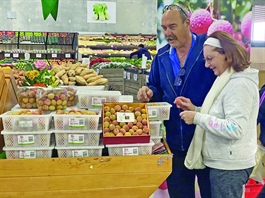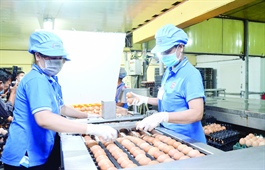Cold storage key to sustainable agricultural exports
Cold storage key to sustainable agricultural exports
In contrast to the slump before Tet, Vietnamese agricultural produce is soaring in price, bringing huge profits to any firm that has been keeping its fruits in cold storage. Meanwhile, firms without cold storages have to sell their fruits at low prices or even throw them away.

Binh Thuan produces around 700,000 tonnes of dragon fruits per year. However, there are just 310 cold stores in the province with a total capacity of 16,000 tonnes. That means more than 97 per cent of its dragon fruits cannot be preserved during trade uncertainty.
“If the province builds more cold storages within production areas, it will help local farmers a lot. With cold stores, we could draw up production plans quarterly or monthly to meet export demand,” said the deputy director of Binh Thuan’s Department of Agriculture and Rural Development.
Nguyen Van Thuan, director of the Tuyen Quang Province’s Sub-Department of Agro-Forestry-Fishery Quality Management, revealed that agricultural products need around 2-24 hours to be transferred cross-province.
Meanwhile, agricultural exports require at least 15 days of preservation during cross-border transportation. The preservation time sometimes doubles or triples for various reasons including sluggish administration and slow delivery.
Preservation plays a crucial role in fruit quality.
Hoang Anh Gia Lai (HAGL) uses low-temperature warehouses to their advantage, thereby doing well in the international market.
HAGL’s bananas are processed and packaged in factories, and then kept in cold storage. Thanks to these ideal conditions, the bananas can be preserved for around 1.5 months at a temperature of 14 degrees Celsius, allowing them to be shipped worldwide without any deterioration in quality.
Chanh Thu Export and Import Fruit Ltd. (CTL) followed suit by building a 10ha processing and preserving factory in Dak Lak Province, which is capable of handling up to 20,000 tonnes of durian.
According to CTL’s deputy chairman, the durian harvest is normally just six months long. Cold storage allows part of the harvested durians to be kept in reserve and processed later. This means the company can export durians even out-of-season.
Many firms know cold storage holds the key to sustainable agricultural exports, but few are financially able to follow the example of HAGL and CTL.
Vo Huy Hoang, chairman of Binh Thuan’ Dragon Fruit Association, noted that modern German-technology stores can keep dragon fruits fresh for about two months, but it takes up to VND500 billion (US$22 million) to build such a store.
A manager of AJ Total Viet Nam also said that high land rental in industrial zones, large investment outlay, high electricity costs and long construction period were factors that have made investors hesitant in investing in cold stores.
According to economic experts, cold storage would stabilise the agricultural market and make farmers less vulnerable to export volatility.
To attract more investment in cold storage, they urged the Government to cut land rental prices in industrial zones, exempt investors from loan interests, impose an electricity ceiling price on cold stores, shorten licensing process and grant subsidies to cold-store agricultural produce.

























